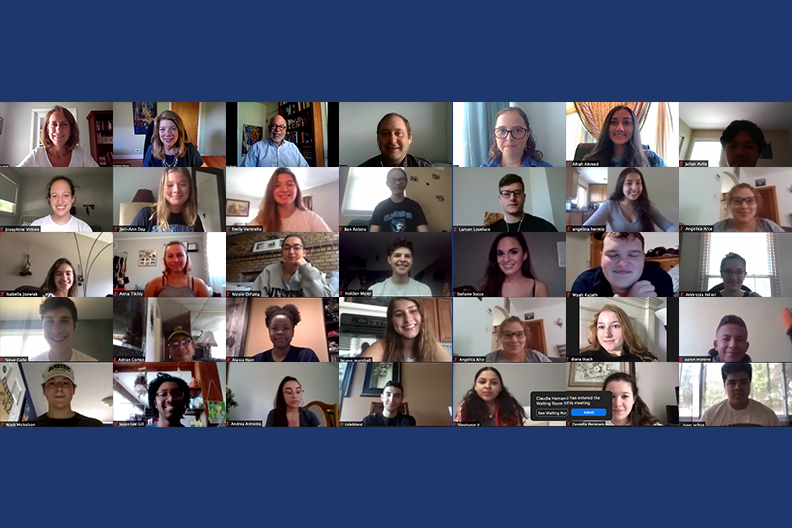 Nearly 50 incoming Elmhurst University students recently completed a summer course that explored several aspects of something they’ve all been living with for the last several months, yet may not have had a chance to learn much about.
Nearly 50 incoming Elmhurst University students recently completed a summer course that explored several aspects of something they’ve all been living with for the last several months, yet may not have had a chance to learn much about.
The course COVID-19: An Interdisciplinary Exploration brought together faculty and experts from a variety of fields to examine the COVID-19 pandemic and its impact in real time. The free, elective-credit online course was offered exclusively to incoming first-year and transfer students. Wrapping up earlier this month, it helped students to stay engaged with the University over the summer, introduced them to faculty members from several areas of study, and showcased the multidisciplinary approach to learning that Elmhurst is known for.
“We’re asking students to think in different ways—holistically, critically—and to make connections across disciplines,” said political science professor Constance Mixon, who developed the course. “We also want them to consider larger issues—not just what’s happening today but how we got here.”
During the first weeks of the course, associate biology professor Kyle Bennett and Molly Tran, director of the University’s graduate program in public health, established the scientific underpinnings of the COVID-19 virus—what it is, where it comes from, how it’s spread and makes you sick, and the public health effects and epidemiological outcomes.
Carmi Neiger, assistant professor of geography and geosciences, introduced the practice of globally mapping the virus to reveal how geographic, political, economic and cultural aspects of human activity affect the spread of the virus and its consequences. Shaheen Wolff, assistant professor in the business and economics department, discussed how the virus has disrupted and changed the global economic order.
Closing out the course, Mixon analyzed the United States’ “upside-down federalism response” to the pandemic—how the response has been shaped by social, economic, political and governmental forces, and what it ultimately reveals about us as individuals and as a nation.
“We asked students to reflect on some hard questions—to consider their own lives, their actions, and what they owe society,” Mixon said.
Jeri-Ann Day, an incoming first-year student, signed up for the course because she was interested in the topic, and for the free course credit. The music education major enjoyed the course’s multidisciplinary approach and getting to know faculty members she otherwise might never have met.
“I learned something new from every part of the class, and I liked meeting and learning from different professors,” she said.
While this summer was the first time the COVID-19 course was offered, it likely won’t be the last, Mixon said. Other iterations could be offered at different points in an academic year, and could bring in faculty from other areas, such as psychology or education. “A course like this truly reflects the interdisciplinary foundations of a liberal arts education,” she said. “I see this as something we can offer year after year because the pandemic has impacted the country in so many different ways, and will continue to affect us all for years to come.”